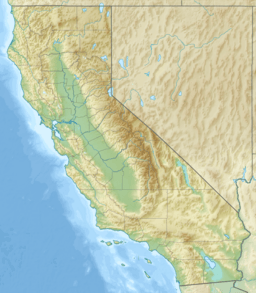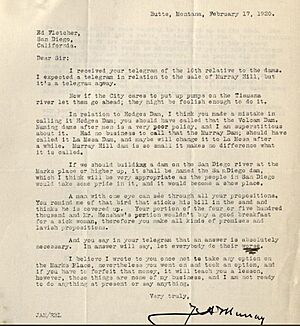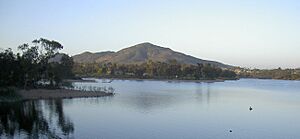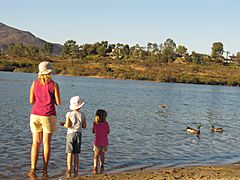Lake Murray (California) facts for kids
Quick facts for kids Lake Murray |
|
|---|---|
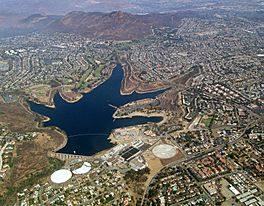
Lake Murray viewed from the air
|
|
| Location | San Diego, California |
| Coordinates | 32°47′10″N 117°02′39″W / 32.7861°N 117.0442°W |
| Type | Reservoir |
| Basin countries | United States |
| Managing agency | City of San Diego |
| Surface area | 171.1 acres (69.2 ha) |
| Max. depth | 95 ft (29 m) |
Lake Murray is a large reservoir (a man-made lake used to store water) located in San Diego, California. The City of San Diego's Public Utilities Department manages this important water source. When the reservoir is completely full, it covers about 171 acres. It can be as deep as 95 feet in some spots. The shoreline stretches for about 3.2 miles.
A paved road goes around most of the lake. This road is a popular place for people from the Navajo community and nearby La Mesa to enjoy outdoor activities. Lake Murray is also south of Cowles Mountain and a small golf course. It even helps pilots flying into Montgomery-Gibbs Executive Airport by serving as a special marker in the sky.
History of Lake Murray
Lake Murray was created in 1894. Workers built an earthen dam to form what was first known as La Mesa Reservoir. In 1910, the dam and reservoir were bought by two important people, James Andrew Murray and Ed Fletcher. They owned the Cuyamaca Water Company.
After a very big flood in San Diego County in 1916, this reservoir became the main source of water for the entire city. To hold more water, the dam was made much larger in 1919. In 1920, the dam and the lake were renamed Lake Murray. This was done to honor James Andrew Murray, who owned most of the water company.
Later, in 1926, Fletcher sold the water company, including the rights to Lake Murray, to another group. Finally, the City of San Diego took over running the reservoir in 1950. They fully bought the reservoir and its water rights in 1961.
Animals and Plants at Lake Murray
Lake Murray is home to many different kinds of wildlife. More than 149 types of birds have been seen and recorded here. This includes large groups of the endangered tricolored blackbird.
The lake also has many kinds of fish. You can find Florida-strain largemouth bass, bluegill, channel catfish, and black crappie. Trout are also added to the lake from November to May for fishing.
Around the lake, you can see many native and naturalized plants. Some interesting ones include the Foxtail agave, Coastal prickly pear, and San Diego barrel cactus. Other plants like Sacred datura and California bulrush also grow here.
Fun Activities at Lake Murray
Lake Murray is a very popular spot for people who love to be outdoors. Many hikers, cyclists, and runners enjoy traveling around the lake's edge. While you can't walk all the way around the dam like at some other lakes, there is a 3.2-mile path. You can get onto this path from several different places.
You are allowed to go kayaking on the reservoir. Fishing is also very popular, but it's usually "catch-and-release." This means you catch the fish and then let them go back into the water. Birdwatchers also love visiting Lake Murray because there are so many ducks, geese, and herons to see. As mentioned, over 149 different bird species have been recorded here.
Lake Murray is open for fishing from the shore. You can also bring your own private boats, kayaks, and float tubes. The California Department of Fish and Wildlife regularly adds fish to the reservoir. They stock it with Florida-strain largemouth bass, bluegill, channel catfish, black crappie, and trout.
 | Jessica Watkins |
 | Robert Henry Lawrence Jr. |
 | Mae Jemison |
 | Sian Proctor |
 | Guion Bluford |


